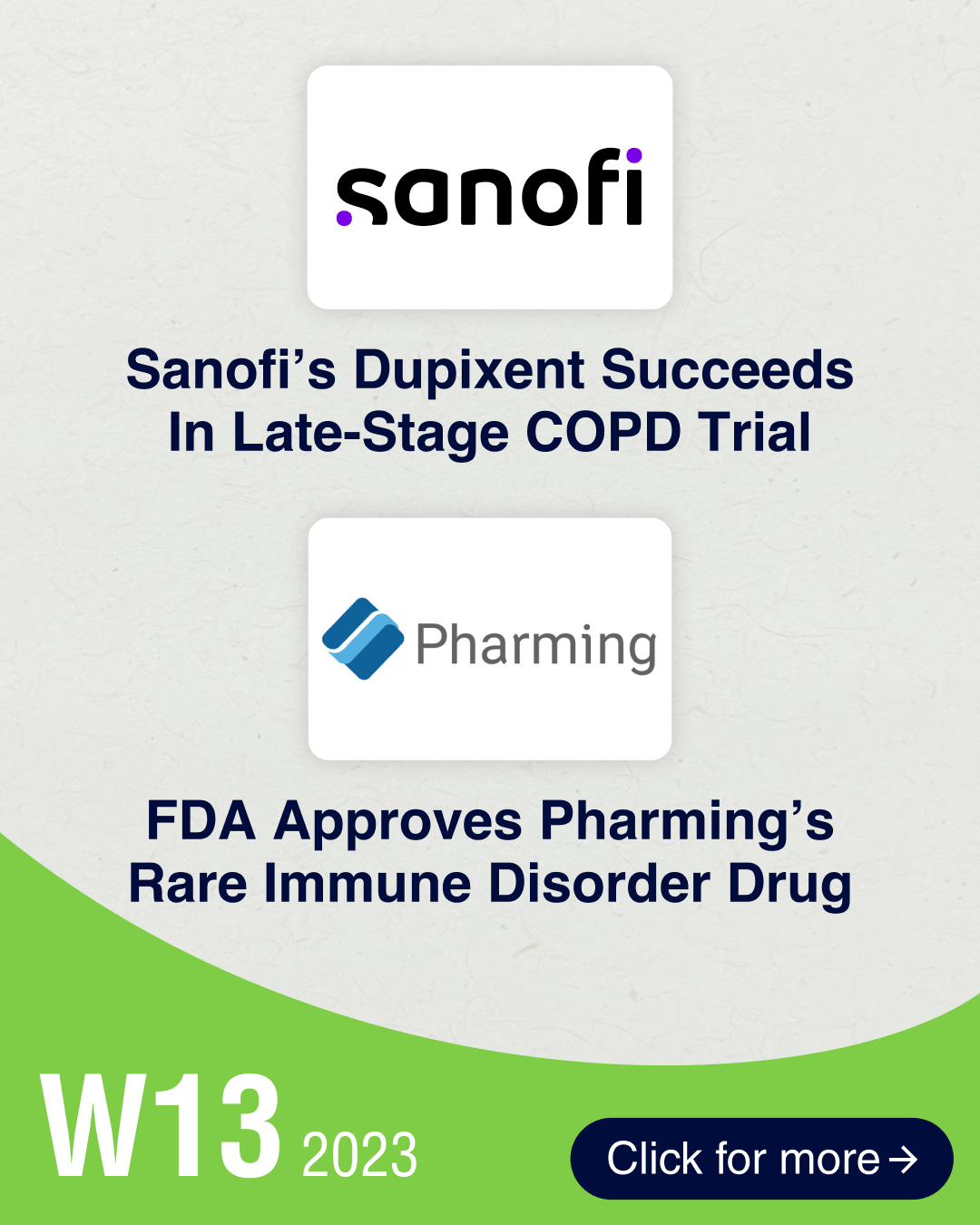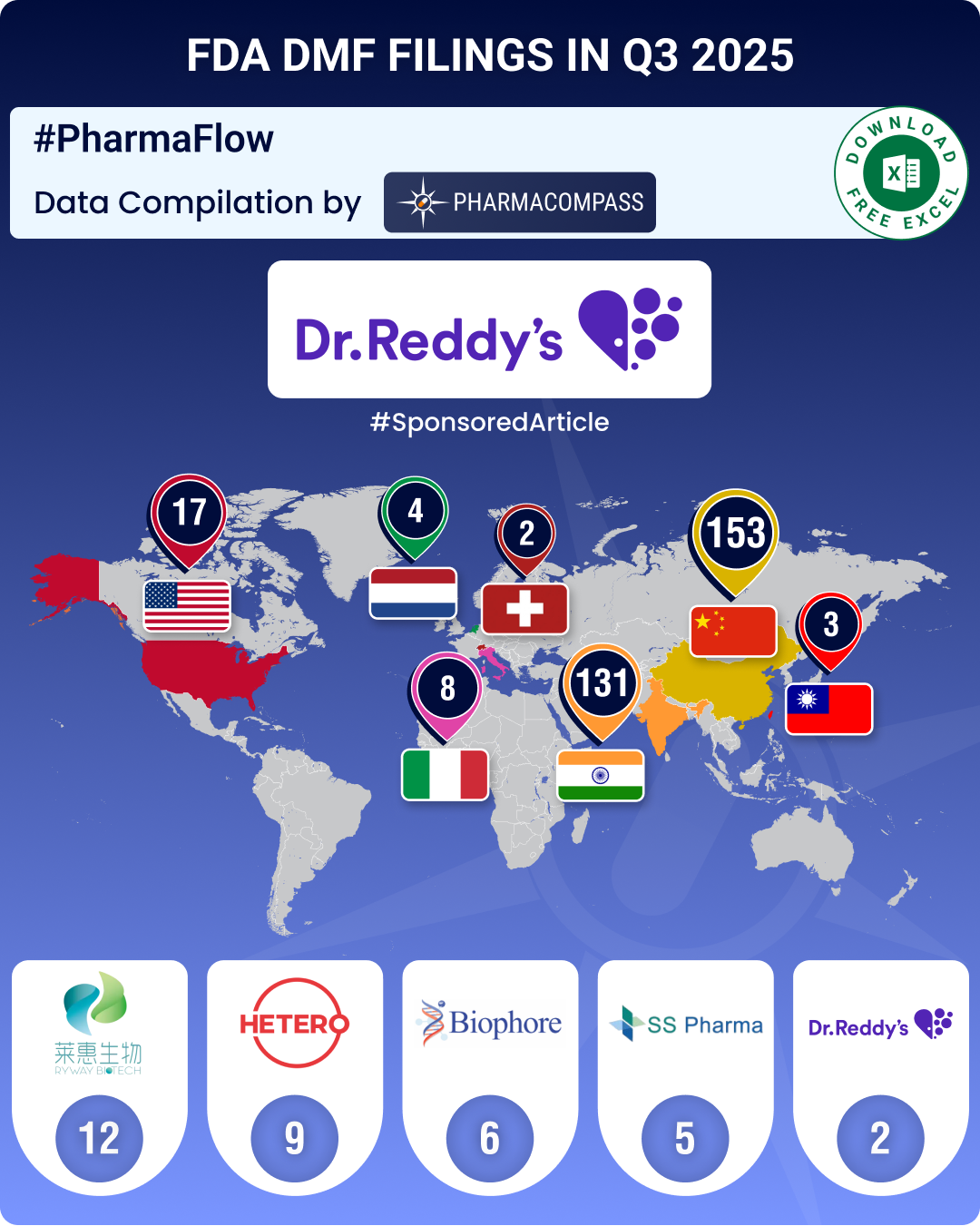
By PharmaCompass
2023-03-30
Impressions: 3,733 Article || 1 Video
Sanofi and Regeneron’s blockbuster drug Dupixent has succeeded in a late-stage clinical trial for chronic obstructive pulmonary disease (COPD). If approved, Dupixent would become the first biologic treatment for the disease.
The Indian government has revoked the licenses of 18 drugmakers for producing substandard and adulterated medicines as part of its nationwide crackdown on spurious drugs. Meanwhile, the World Health Organization (WHO) has issued a warning about a cancer drug manufactured by India-based Celon Labs after authorities in Yemen and Lebanon found life-threatening bacteria in one of the batches.
In other regulatory news, the US Food and Drug Administration (FDA) has issued a Form 483 with two minor procedural observations to Alembic Pharmaceuticals’ injectable and ophthalmic facility in Gujarat (India).
In approvals, FDA has approved Dutch biotech Pharming Group’s Joenja as the first treatment for activated phosphoinositide 3-kinase delta syndrome (APDS), a rare genetic disorder. The agency has also approved Emergent BioSolutions’ Narcan, a naloxone-based drug used to reverse opioid overdoses, for over-the-counter (OTC) sales in the US. And the European Commission has authorized Bristol Myers Squibb’s Sotyktu in adults with moderate-to-severe plaque psoriasis.
AbbVie’s blockbuster drug Skyrizi has achieved a win in a late-stage trial for adults with moderate-to-severe active ulcerative colitis. Novartis’ Kisqali plus endocrine therapy has proved to be effective in treating patients with hormone receptor-positive/human epidermal growth factor receptor 2-negative (HR+/HER2-) early breast cancer at risk of recurrence in a phase 3 trial. And, Novartis has inked a potential US$ 1.7 billion deal with Bicycle Therapeutics to discover and develop radiopharmaceuticals for cancer.
Sanofi-Regeneron’s blockbuster Dupixent succeeds in late-stage COPD trial
Sanofi and Regeneron’s blockbuster anti-inflammatory drug Dupixent has succeeded in a late-stage clinical trial for COPD – a disease that causes a progressive decline in lung function.
The trial focused on COPD patients with type 2 inflammation who received Dupixent or a placebo every two weeks as an add-on therapy to standard inhaled treatments. Those who received Dupixent showed a 30 percent reduction in exacerbations over 52 weeks and improvements in lung function, quality of life and other disease markers. A second late-stage trial of the drug in COPD is going on, with results expected in early 2024.
If approved, Dupixent would become the first biologic treatment for COPD. Analysts estimate a label expansion to treat COPD would add US$ 2.5 billion in peak sales for Dupixent in the US and an additional US$ 1 billion outside of the US.
India cancels licenses of 18 drugmakers for producing poor quality medicines
The Indian government has revoked the licenses of 18 drugmakers for producing substandard and adulterated medicines. As part of a nationwide crackdown on spurious drugs, the Drugs Controller General of India conducted inspections on 76 companies across 20 states. The regulator has issued show-cause notices to 26 firms and cancelled product permissions of three companies.
The raids come amid reports of deaths and illnesses in The Gambia and Uzbekistan caused by spurious drugs manufactured by Indian companies. The names of the affected companies have not been disclosed. Most of the companies are located in the three Indian states of Himachal Pradesh, Uttarakhand and Madhya Pradesh.
WHO issues alert over India-made cancer drug being sold in Yemen, Lebanon
The World Health Organization (WHO) has issued a warning about a cancer drug manufactured by India-based Celon Labs after authorities in Yemen and Lebanon found life-threatening bacteria in one of the batches.
The drug Methotrex (methotrexate), an injectable chemotherapy agent and immune system suppressant, was found to contain the Pseudomonas aeruginosa bacteria that can be harmful to people with weak immune systems.
Health authorities in both countries raised concerns after children reported adverse effects from the drug. The WHO said the contaminated batch was intended for sale only in India, but may have been distributed to Yemen and Lebanon through informal channels.
The Indian government confirmed that the WHO alert was for Celon’s Methotrex 50mg vials. The Telangana government issued a show-cause notice and ordered the company to halt production of the drug. Celon was acquired by UK-based biopharma ZNZ Pharma 2 in 2020.
FDA approves Pharming Group’s Joenja as first drug for rare immune disorder
FDA has approved Dutch biotech Pharming Group’s Joenja (leniolisib) as the first treatment for activated phosphoinositide 3-kinase delta syndrome (APDS), a rare genetic disorder that weakens the immune system. The agency’s approval for the use of the drug in patients aged 12 years and above is based on data from a late-stage study. Pharming, which acquired global rights to Joenja from Novartis in 2019, plans to launch the drug in the US in April.
Meanwhile, the European Commission has authorized Bristol Myers Squibb’s once-daily oral drug Sotyktu (deucravacitinib) in adults with moderate-to-severe plaque psoriasis who are eligible for systemic therapy. The drug is the first TYK2 inhibitor to be authorized for any disease in the European Union. And, UK’s National Institute for Health and Care Excellence (NICE) has backed AstraZeneca and Amgen’s Tezspire as a maintenance treatment for people 12 years and older with severe asthma.
Emergent’s opioid overdose reversal spray approved for OTC sales: Emergent BioSolutions’ Narcan, a medication used to reverse opioid overdoses, has been approved by the FDA for over-the-counter (OTC) sales in the US, making it the first naloxone-based treatment to be sold without a prescription. Emergent said the nasal spray will be available by late summer. Last month, a panel of FDA experts voted unanimously in favor of the drug’s OTC status.
FDA proposes rigorous testing for accelerated approval of cancer drugs: The FDA has issued a draft guidance for cancer drugmakers seeking accelerated approval for their candidates. The agency has proposed limiting single-arm trials, or trials that test the drug without a comparator. It is in favor of randomized controlled trials in which patients receive either a therapy or another alternate treatment. The draft follows criticism for an accelerated approval pathway.
Meanwhile, the agency has convened a two-day meeting of its advisory panel in May to discuss Perrigo’s over-the-counter (OTC) birth control pill, Opill. The drug has been used as a prescription drug since 1973.
AbbVie’s Skyrizi achieves success in late-stage ulcerative colitis trial
AbbVie’s blockbuster drug Skyrizi (risankizumab) has successfully achieved a win in a late-stage trial for adults with moderate-to-severe active ulcerative colitis, a type of inflammatory bowel disease affecting the large intestine. Patients treated with Skyrizi as an induction therapy had a higher percentage of clinical remission compared to those given a placebo at week 12. The drug is already approved in the US for treating psoriasis, psoriatic arthritis and Crohn’s disease.
Novartis’ Kisqali reduces risk of early breast cancer recurrence: The use of Novartis’ Kisqali (ribociclib) plus endocrine therapy following surgery has proven to be effective in treating patients with hormone receptor-positive/human epidermal growth factor receptor 2-negative (HR+/HER2-) early breast cancer at risk of recurrence in a phase 3 trial.
Novartis-Bicycle deal: Novartis has inked a potential US$ 1.7 billion deal with Bicycle Therapeutics to discover and develop radiopharmaceuticals for cancer using the UK-based biotech’s bicyclic peptide technology. Bicycle will receive US$ 50 million upfront and will be eligible for up to US$ 1.7 billion milestone payments as well as tiered royalties.
Astra, Ionis drug wins phase 3 trial in ATTR: AstraZeneca and Ionis’ eplontersen have been effective in reducing levels of a critical biomarker and improving symptoms and quality of life for patients with hereditary transthyretin-mediated amyloid polyneuropathy (ATTRv-PN) in a phase 3 trial. Over time, ATTRv-PN leads to the accumulation of anomalous proteins in organs and tissues.
Alembic’s injectable and ophthalmic facility in India hit by FDA Form 483
FDA has issued a Form 483 with two minor procedural observations to Alembic Pharmaceuticals’ injectable and ophthalmic facility (F-3) located at Karkhadi in Gujarat (India). The agency had conducted the inspection from March 16 to 24. None of the observations pertain to data integrity, the company said.
Meanwhile, Indian drugmaker Zydus Lifesciences has recalled over 55,000 bottles of its generic treatment for gout, Colchicine, in the US due to “failed impurities/degradation specifications”.
FDA rejects Incyte’s extended-release ruxolitinib tablets: FDA has rejected Incyte’s extended-release formulation of ruxolitinib tablets as a once-daily treatment of myelofibrosis, polycythemia vera, and graft-versus-host disease. The agency issued a complete response letter stating that while Incyte’s study met its objective of bioequivalence based on area under the curve criteria, it requires additional data for approval.The PharmaCompass Newsletter – Sign Up, Stay Ahead
Feedback, help us to improve. Click here
Image Credit : Phisper Infographic by PharmaCompass license under CC BY 2.0
“ The article is based on the information available in public and which the author believes to be true. The author is not disseminating any information, which the author believes or knows, is confidential or in conflict with the privacy of any person. The views expressed or information supplied through this article is mere opinion and observation of the author. The author does not intend to defame, insult or, cause loss or damage to anyone, in any manner, through this article.”








